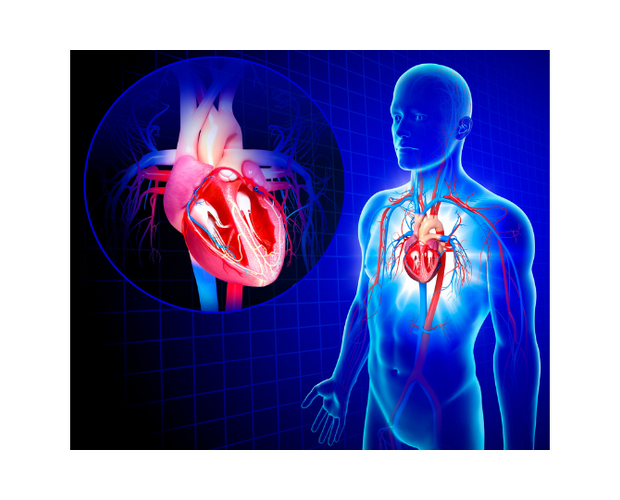Your Heart Is More Than Just A Heart. It Is The Emperor Of All Organs
Feb 3rd 2024
What Organ on the body is considered Emperor of all Organs?
Your heart transcends its physical function, emerging as the sovereign ruler among all organs in the intricate symphony of the human body.

In Traditional Chinese Medicine (TCM), the heart holds a unique and elevated
position as the "emperor" of all organs. This designation goes beyond
its physical function of pumping blood and reflects a more holistic
understanding of its role within the body and mind. Here are several key
reasons why:
1. Governance and Coordination:
- The heart, through its connection to the circulatory system, acts as the central hub for supplying oxygen and nutrients to every other organ. This vital role in nourishing and sustaining all other parts of the body earns it the emperor-like title.
- Just as an emperor oversees and coordinates the various functions of a kingdom, the heart is seen as coordinating the interconnected functions of all other organs through its influence on blood flow and the energetic system (Qi).

2. Connection to the Mind and Spirit:
- TCM views the heart as the seat of the Shen, which can be translated as "spirit" or "consciousness." This implies that the heart plays a crucial role in our emotions, awareness, and mental well-being. A balanced and healthy heart, therefore, contributes to a clear mind and emotional stability.
- The emperor, in many cultural contexts, embodies wisdom, compassion, and leadership qualities. Similarly, the heart in TCM is associated with these attributes, as its health is believed to affect our decision-making, clarity of thought, and emotional resilience.
3. Influence on Other Organs:
- According to TCM principles, the health of the heart can directly impact the well-being of other organs. Imbalances in the heart's functioning can manifest as issues in other organ systems, highlighting its central role in maintaining overall health.
- This interconnectedness further reinforces the emperor metaphor, where the emperor's decisions and well-being have a ripple effect on the entire kingdom.
4. Yin-Yang Balance:
- In TCM, the body is seen as governed by the balance of Yin and Yang energies. The heart is associated with Yang energy, representing warmth, activity, and dynamism. As the "emperor," it plays a central role in maintaining this vital balance, ensuring the harmonious functioning of both Yin and Yang energies throughout the body.
Understanding the TCM Perspective:
Unlike conventional medicine, which focuses primarily on physical structures and functions, TCM takes a holistic approach, viewing the heart as more than just a pump. It considers the heart as the emperor of all organs, intricately connected to emotions, spirit, and overall energy flow (Qi). Imbalances in Qi and blood stasis (stagnation) are believed to contribute to various heart-related concerns. Addressing these imbalances through personalized herbal formulas lies at the heart of TCM's approach.

Exploring the Powerhouse of Herbs:
The vast pharmacopoeia
of TCM boasts a remarkable selection of herbs, each with distinct properties
and potential benefits for the heart and circulation. Here are a few
highlights:
Hawthorn: This widely used herb
strengthens the heart muscle, improves blood flow, and contributes to healthy
blood pressure regulation. Its antioxidant properties may also combat free
radical damage.
Dan Shen: Known for its anti-inflammatory and antioxidant effects, Dan Shen protects the heart and improves blood flow by reducing platelet aggregation and promoting vasodilation.
Ginseng: This revered herb tonifies Qi, enhances energy levels, and can improve heart function by reducing fatigue and promoting oxygen utilization.
Fu Zi: This warming herb invigorates Qi and circulation, particularly beneficial for those with cold hands and feet and deficient Yang energy.
Ling Zhi: This adaptogenic mushroom strengthens the immune system and supports cardiovascular health by reducing inflammation and improving blood viscosity.

Beyond Herbs: A Holistic Approach:
TCM offers a multifaceted approach to heart health, emphasizing not just herbs but also lifestyle practices:
- Dietary Therapy: Focusing on nourishing foods like fruits, vegetables, whole grains, and lean proteins while limiting processed foods, excessive salt, and unhealthy fats supports a healthy heart and circulation.
- Acupuncture: This ancient practice stimulates specific points on the body to balance energy flow, potentially improving blood flow, reducing stress, and promoting overall well-being.
- Tai Chi: These gentle exercises integrate movement, breathwork, and meditation, promoting relaxation, flexibility, and improved circulation.
What symptoms to look for when the heart is not functioning correctly?
First and foremost it's essential to seek immediate medical attention from a qualified healthcare professional. They can properly assess your situation and offer appropriate diagnosis and treatment. Don’t wait, don’t think it will pass, don’t think oh I have just pulled a muscle. Seek out a qualified healthcare professional, before it is too late.
Here are a few issues that you may have when your heart is not working properly.
Chest pain or discomfort: This is a classic symptom, though it can vary in intensity and location. It can feel like pressure, tightness, squeezing, burning, or achiness in the chest, jaw, neck, arms, or back. Sometimes it's described as an "elephant sitting on your chest."
Shortness of breath: This can occur at rest or with exertion, and may be accompanied by wheezing or difficulty breathing deeply.
Fatigue: Unusual tiredness or exhaustion, even after adequate sleep, can be a sign of heart problems.
Other symptoms: These can include dizziness, lightheadedness, fainting, palpitations (feeling like your heart is racing or fluttering), swelling in the ankles or feet, sweating, nausea, or vomiting.
Remember: This list is not exhaustive, and some people may experience no symptoms at all. If you have any concerns about your heart health, please don't hesitate to seek professional medical advice immediately.
Here are some resources that can help:
- The American Heart Association: [https://www.heart.org/]
- The National Heart, Lung, and Blood Institute: [https://www.nhlbi.nih.gov/]
References:
https://my.clevelandclinic.org/health/body/21704-heart
https://www.youtube.com/watch?v=CWFyxn0qDEU
https://www.medicalnewstoday.com/articles/320565
https://www.urmc.rochester.edu/encyclopedia/content.aspx?contenttypeid=85&contentid=P00192


